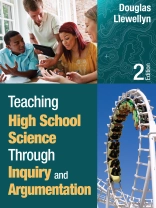Proven ways to teach next generation science!
The numbers are in and the pressure is on. The U.S′s lead in science is very much at risk. If we′re to help ensure our students achieve scientific literacy, we need to take a critical look at what′s working and what isn′t. One thing we know for certain: inquiry and argumentation are key, and the single-best resource on the subject is Teaching High School Science Through Inquiry and Argumentation.
Devoted to Grades 9–12, this new edition of Douglas Llewellyn′s ground-breaking text aligns the four key elements of effective science education: scientific literacy, inquiry, argumentation, and the nature of science. Fully revised, the second edition features
- Content that addresses the new direction of science standards
- Exceptional coverage of scientific argumentation
- Enhanced chapters on assessment and classroom management
- Questioning techniques that promote the most learning
- Activities that emphasize making claims and citing evidence
- New examples of inquiry investigations
- New approaches to traditional labs
- Case studies and vignettes that model exemplary science instruction
With its standards-based content, there′s no better resource to help you elevate your teaching to meet the call for instructional reform.
Douglas Llewellyn teaches science education courses at St. John Fisher College in Rochester, New York. Previously, he was the K–12 Director of Science at the Rochester City School District, a junior high school principal, and a middle school science teacher. His books include Inquire Within: Implementing Inquiry-Based Science Standards in Grades 3–8 and Differentiated Science Inquiry, both published by Corwin.
‘Llewellyn′s approach supports educators in realizing the central role argumentation plays in helping students make defensible connection between claims, data, evidence, and explanations. Not only is this a timely publication, but one that is sure to be well-used.’
—Page Keeley, Past President, National Science Teachers Association
Author of Science Formative Assessment
表中的内容
Preface
About the Author
Chapter 1: Constructing an Understanding of Inquiry
Chapter 2: Constructing an Understanding of Scientific Argumentation
Chapter 3: Learning About Inquiry and Argumentation Through Case Studies
Chapter 4: Choosing to Become an Inquiry-Based Teacher
Chapter 5: Developing a Philosophy for Inquiry
Chapter 6: Four Levels of Science Inquiry
Chapter 7: Modifying a Lab Activity Into an Inquiry- and Argument-Based Investigation
Chapter 8: Managing the Inquiry-Based Classroom
Chapter 9: Developing Effective Questioning Skills
Chapter 10: Assessing Scientific Inquiry
Chapter 11: Creating a Classroom Culture of Inquiry and Argumentation
Resource A: Resources for High School Science Teachers
Resource B: Bottle Handout
References
Index
关于作者
Douglas Llewellyn teaches science education courses at St. John Fisher College in Rochester, NY. Previously, he was the K-12 Director of Science at the Rochester City School District, a secondary school principal, and a middle school science teacher. Llewellyn is a frequent speaker at state and national conferences on inquiry- and argument-based teaching, constructivist learning, and science leadership.












